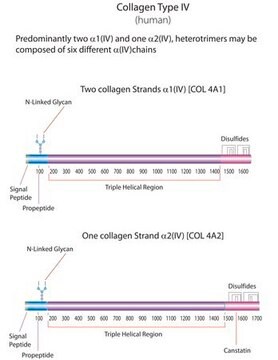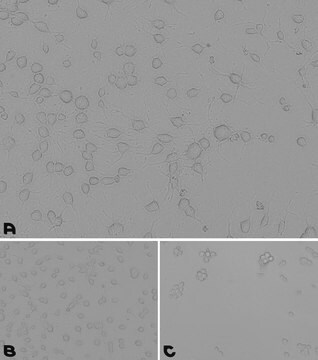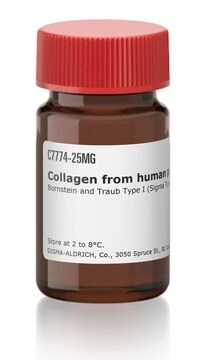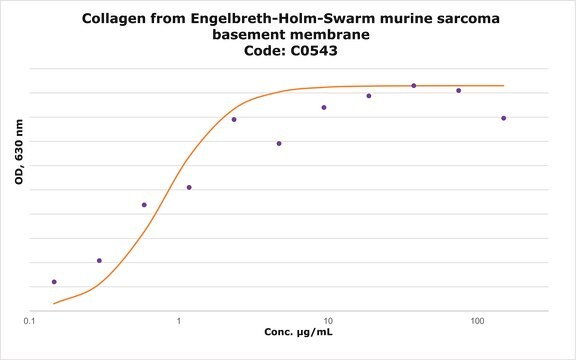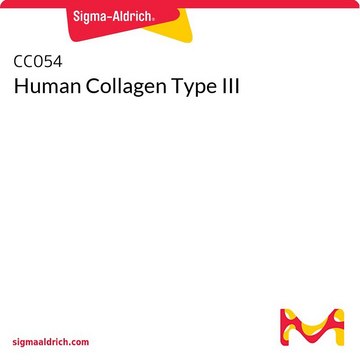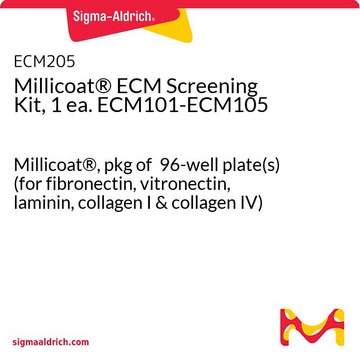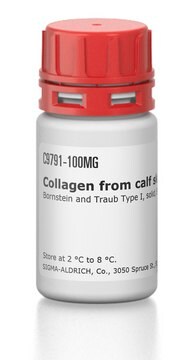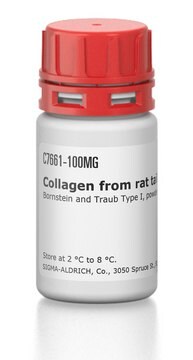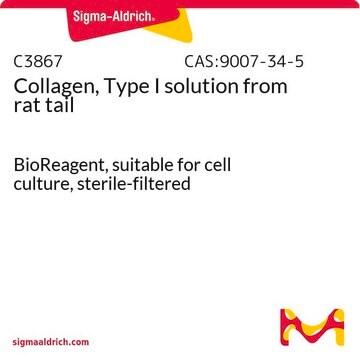ECM105
Human Collagen Type IV
MILLICOAT® Human Collagen Type IV Coated Strips (96-Wells), suitable for cell culture
Sinonimo/i:
Formerly under the CytoMatrix ™ brand name.
About This Item
Prodotti consigliati
Nome del prodotto
Millicoat® Human Collagen Type IV Coated Strips (96-Wells), 96-well plate coated with human Collagen Type IV used for cell adhesion studies.
Origine biologica
human
Livello qualitativo
Stato
lyophilized
Reattività contro le specie
human
Produttore/marchio commerciale
Chemicon®
Millicoat®
tecniche
activity assay: suitable
cell based assay: suitable
input
sample type: mouse embryonic stem cell(s)
sample type hematopoietic stem cell(s)
sample type epithelial cells
sample type neural stem cell(s)
sample type induced pluripotent stem cell(s)
sample type pancreatic stem cell(s)
sample type mesenchymal stem cell(s)
sample type: human embryonic stem cell(s)
N° accesso NCBI
N° accesso UniProt
Metodo di rivelazione
colorimetric
Condizioni di spedizione
wet ice
Informazioni sul gene
human ... COL4A1(1282)
Descrizione generale
Applicazioni
NOTE: Optimal assay timing and performance may vary for different cell lines but generally can be obtained using subconfluent cell cultures in the assay described below. Subconfluent cultures can be achieved by splitting cells 1 to 2 days prior to performing the assay.
1. Rehydrate the strips with 200 mL of PBS per well for at least 15 minutes at room temperature. Remove the PBS from the rehydrated strips.
2. Prepare a single cell suspension, preferably using a non-enzymatic dissociation buffer. Optimum cell density may be determined by titration of the cells. A common starting range is between 1x10E05 to 1x10E07 cells/mL.
3. Add 100 mL of the diluted cell suspension to each well. Incubate the plate at 37°C for 45 minutes in a CO2 incubator. Gently wash the plate 2-3 times with PBS containing Ca2+/Mg2+ (200 mL/well).
4. Add 100 mL of 0.2% crystal violet in 10% ethanol to each well. Incubate for 5 minutes at room temperature. Remove the stain from the wells. Gently wash the strips 3-5 times with PBS (300 mL/well) to remove the excess stain.
5. Add 100 mL of Solubilization Buffer (A 50/50 mixture of 0.1M NaH2PO4, pH 4.5 and 50% ethanol) to each well. Allow strips to incubate and gently shake at room temperature until the cell-bound stain is completely solubilized; approximately 5 minutes.
6. Determine the absorbance at 540 - 570 nm on a microplate reader.
Cell Structure
Confezionamento
Stoccaggio e stabilità
Note legali
Esclusione di responsabilità
Codice della classe di stoccaggio
11 - Combustible Solids
Classe di pericolosità dell'acqua (WGK)
WGK 3
Punto d’infiammabilità (°F)
Not applicable
Punto d’infiammabilità (°C)
Not applicable
Certificati d'analisi (COA)
Cerca il Certificati d'analisi (COA) digitando il numero di lotto/batch corrispondente. I numeri di lotto o di batch sono stampati sull'etichetta dei prodotti dopo la parola ‘Lotto’ o ‘Batch’.
Possiedi già questo prodotto?
I documenti relativi ai prodotti acquistati recentemente sono disponibili nell’Archivio dei documenti.
I clienti hanno visto anche
Articoli
Extracellular matrix proteins such as laminin, collagen, and fibronectin can be used as cell attachment substrates in cell culture.
Contenuto correlato
This page covers the ECM coating protocols developed for four types of ECMs on Millicell®-CM inserts, Collagen Type 1, Fibronectin, Laminin, and Matrigel.
Il team dei nostri ricercatori vanta grande esperienza in tutte le aree della ricerca quali Life Science, scienza dei materiali, sintesi chimica, cromatografia, discipline analitiche, ecc..
Contatta l'Assistenza Tecnica.
